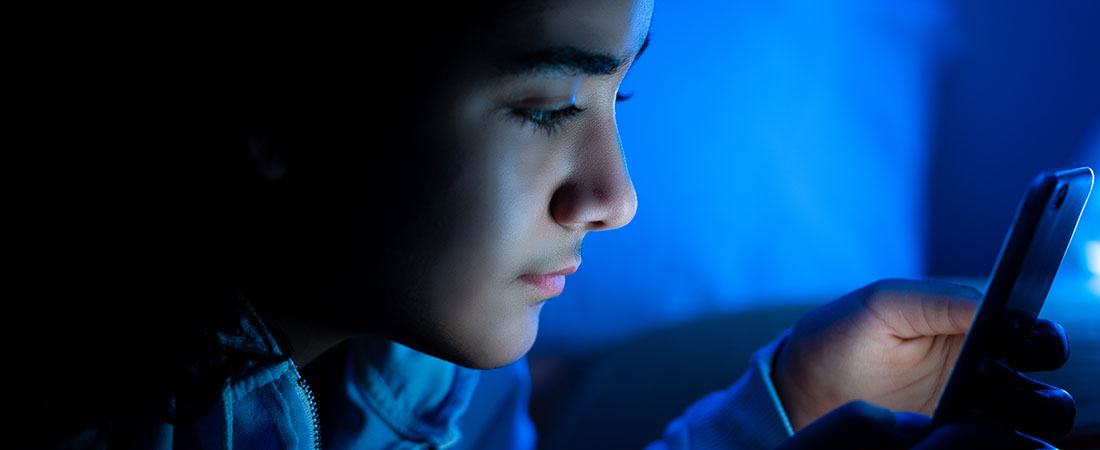
Think of everything a child might do in a day. They go to school, play sports, practice an instrument, do homework, and socialize with friends and family. After their busy days, their bodies need rest. However, the 2023 School Health and Risk Prevention (SHARP) Survey found that only 38.4% of Utah youth reported getting 8 or more hours of sleep on an average school night. That’s the recommended amount of sleep kids need for optimal health.
Our children and teens are struggling to get enough sleep each night—and the high volume of screen time and social media use is not helping.
Children need sleep. It restores their energy, recharges their bodies, and helps them retain information. Sleep is critical to prevent poor mental health and attention or behavioral issues. As adults, the effects of not getting enough sleep are evident in the way we feel the next day. We feel grouchier, less focused, less energetic, and less able to participate in the activities we enjoy. Children experience this too, and they need even more sleep than adults do.
How social media negatively impacts sleep
With almost half of teens saying they use the internet “almost constantly” and nearly 1-in-3 adolescents using screens until midnight or later, parents, educators, and caregivers need to be aware of the impact social media has on mental health and sleep. Social media often displaces time that should be dedicated to sleep, and this sleep disruption has harmful effects on the mental, physical, and emotional health of children and teens.
On TikTok specifically, 19% of the app’s 13- to 15-year-old users and 25% of their 16- to 17-year-old users globally are active on TikTok between midnight and 5:00 a.m. TikTok sends push notifications directly to users’ phones, both during school and sleeping hours.
In Utah, the 2023 SHARP survey asked 52,000 students across the state about their screen time usage. Nearly 80% (79.8%) of Utah’s students reported spending two or more hours a day on screens (not counting school work)—up from 66.7% in 2019. The results also showed a strong relationship between screen time and lack of sleep, thoughts of suicide, and substance use.
Data shows that the use of technology, especially social media, within one hour of bedtime is associated with sleep disruptions. There are associations between digital media use and delayed sleep, daytime sleepiness, sleep duration and quality, and sleep deficiency for 16- to 25-year-olds. Sleep loss and insufficient sleep can influence neurological development and are risk factors for depression, suicidal thoughts, mood disturbances, injuries, attention problems, and excessive weight gain.
In May 2023, the U.S. Surgeon General released an advisory about social media and youth mental health. The advisory underscored the harmful effect of social media on sleep, stating that excessive or uncontrollable social media use has been linked to sleep and attention problems and feelings of exclusion among adolescents. More youth are spending time on their electronic devices than ever before, and it is affecting their quality and quantity of sleep as well as their mental health.
Hear from the experts
Dr. Michelle Hofmann is a mom, pediatrician, and the executive medical director of Clinical Services at the Utah Department of Health and Human Services. She says not getting enough sleep also impacts children’s ability to be successful in school, sports, and relationships.
“Think about how bright those screens are. They really keep us up and alert and are really damaging to sleep cycles,” says Dr. Hofmann. “They [children] need that time and the distractions of phones and any bright lights in the room are really damaging to sleep hygiene.”
Mandy Chapple is the principal at Granite Technical Institute in South Salt Lake. She regularly conducts investigations of student online behavior and pays attention to when students tend to post.
“I will notice when students are posting those messages and it’s often times in the middle of the night,” says Chapple. “1 a.m., 2 a.m., 3 a.m., 4 a.m. You can see what kind of disruption this gives for students as they’re trying to get the sleep that they need, and then they come to school sleep deprived because they’re just on their phones all day long and sometimes at night.”
What parents can do
“It’s really critical to move phones into the kitchen to have them away from the bedroom,” Dr. Hofmann says. And not just for kids, but for adults, too. Electronics can be a distraction after bedtime and interfere with sleep. Consider restricting the use of phones, tablets, and computers for at least one hour before bedtime and throughout the night.
Some other tactics parents can implement to reduce their children’s screen time at night are:
- Teach kids about technology and empower them to use it responsibly at the appropriate age. Have conversations with them about how they are spending their time online and encourage them to seek help if they need it.
- Work with other parents to establish shared norms about phone usage at night. Despite what your kids may say, you’re not the only parent who won’t let their children use social media at night or who sets family rules about phones and technology.
- Model responsible social media behavior yourself by limiting your own use and being mindful of social media habits, especially at night.
The more we know, the more we can help our kids by building a supportive, safe, and healthy environment at home.